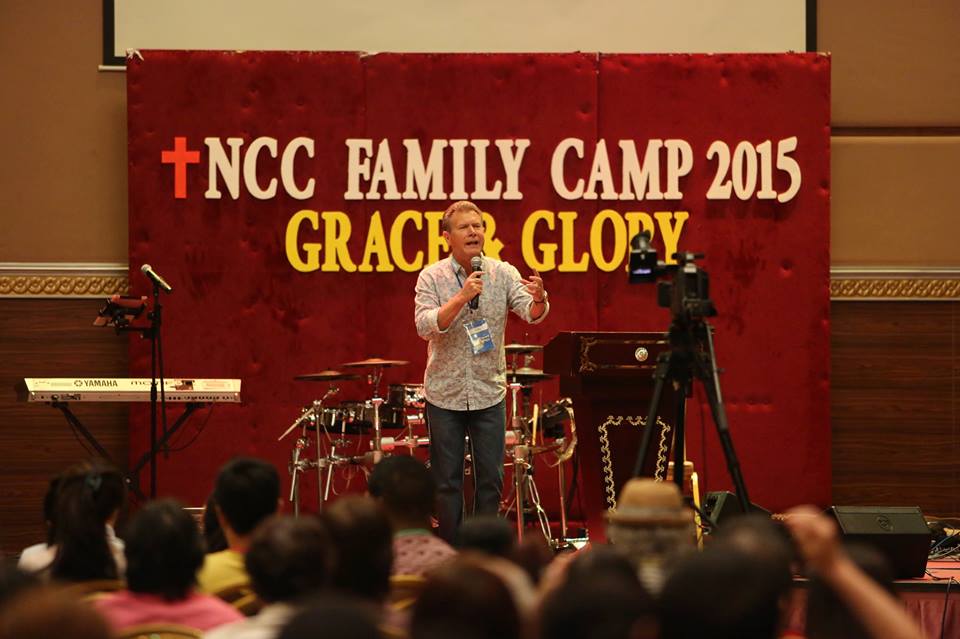Grace and Glory: Rob Rufus at tNCC Family Camp


By Jason Law, Christianity Malaysia
I am sure that many of you have sensed a certain imbalance in the Church today. Due to unfortunate exploitation by some people, the word ’Grace’ has today gained a sort of sullied connotation, meaning taking God for granted or the pursue of a hedonistic lifestyle.
But when the pendulum swings to the other extreme, you also get dire messages about 2 out of every 7 Christians going to Heaven while the rest are lost to damnation. This is the sort of message that takes passages like Revelations 2 and 3 out of context. At best, it seems to imply that the Christian’s salvation is based on their self-effort (merit based on how well they follow the Law) or through their knowledge. At worst, it seems to imply that the speaker is one of 2 out of every 7 that will enter into heaven while the rest will go to hell.
Yet the glory of God is also intrinsically tied to His grace. How could we miss this when the cross itself is such a stark reminder? That while we were still undeserving sinners Christ came down to the level of a human being and was crucified for our sakes?
God is not a tyrannical dictator, yet we also shouldn’t take Him for granted. He is also not some sort of cosmic Santa Claus or errand boy. True relationships with Christ will bring a balanced understanding on how God’s grace is tied to His glory. In tNCC’s recent camp, based on the theme, ‘Grace and Glory’, Rob Rufus shared on the topic.
The Good News Going Out All Over the World
Rob shared that many Christians today go around with a concept of Grace in their heads. Yet, few of us really understand Grace deep down in our spirits or have experienced it. And sometimes, we share the Christian message in such a way.
It is like a person dying of thirst in the desert and receiving a paper with H2O written on it. He is desperately in need of the saving touch of the Living Water and instead all he receives is a concept written on paper or spoken from the mouth.
Christ’s intention for the Church was one of power, given by God when we were adopted by Him into His family. Colossians 1:6 speaks about the Good News taking root and changing lives everywhere it is heard and understood. In John 8:12, Christ promised that we would walk in the light that would lead to eternal life if we follow Him. The Bible speaks of God’s grace in superlatives; it is not a cheap or shallow type of thing (Acts 4:31-33; Ephesians 1:7; Philippians 4:19; Hebrews 4:16).
Yet so many Christians walk around with joyless, defeated lives. When God is raising churches, discouragement and condemnation comes in to steal and destroy. Why is this? Rob shared that when we are in Christ, the fruit ought to be one of an abundance of life. The truth of God’s grace through Christ sets us free from our bondages.
God’s grace is a multidimensional truth and His word is incorruptible seed. However, the condition of a person’s heart makes a difference. We need to gain a true understanding of God’s grace and continue in the knowledge of that grace.
The Subjective Experience of Grace
Rob shared that there are certain things that are universal and objective truths. If we step off from a platform, we are going to fall. We need air and food to survive. God created everything and He is the Lord of everything. Salvation comes from a relationship with God. These are all important objective truths, and it is vital to read the Bible and pray to God and learn more about Him, but in order to grow, we need more than head knowledge. We need the subjective experience of who God is in all of its completeness, even unto the Godly meaning of Grace.

Worship session in camp.
How do we experience God’s grace? First, we must truly believe in it by faith. It is when the word of God becomes Truth that we are set free to receive more of Him. We must desperately thirst for the Living Water, the person of Christ in our lives.
Rob conveyed that we must build upon the foundation of our acceptance by God, overcoming dejection, insecurity, jealousy, and condemnation, even some that may have been built up over the years. ‘Don’t let our validation be centered on the things we do or cannot do but be on the person of Christ’.
The Problem of the Law is Not with the Law
In Hebrews 7:18-19, Paul writes about the old Law of priesthood being set aside because it was weak and useless. And then he wrote that the Law never made anyone perfect, but that we have a better hope in Christ. Does that mean the old Law is weak and useless?
The Law itself is not weak and useless, Rob communicated. Like everything that comes from God, it is holy, righteous, and magnificent. And if Christians and everyone else on earth were to follow it, this world would be very different from the one it is today.

Rob Rufus sharing.
The problem here is an intrinsic one. In order for the Law to work, it starts from us. We need to obey it, and in the Old Covenant, obedience means 100%. The problem is us and our fallen condition. The Law is important because it exposes our spiritual bankruptcy but it doesn’t save us.
The New Covenant is extrinsic. It has nothing to do with us and have everything to do with Christ. It is made through Christ and cut within the Tri-unity. It came from God’s plan to include us in Christ; before the world, He predestined us to be in complete unity with Himself. Because it has everything to do with Christ, the New Covenant is self-existing and self-sustaining.
The Old Covenant fails if we fail. In order for the New Covenant to fail, the Father needs to fail. That is the strength of the New Covenant. It is a perfect covenant, applied through the power of the Holy Spirit.
The Heart of the Father
Nothing reveals so much to us about the Father’s heart as the parables of Luke 15. It is God that justifies us, not men, and we must free ourselves from the need to please men. When God empowers us with His grace, it is for the purpose of release to do good works, not for the acceptance of men, but through our sense of acceptance by God (Hebrews 10).
Our intentions and motives must be pure, Rob communicated. ‘Don’t be afraid of dead works, that is work done by fear of men’s approval rather than through faith. Be afraid of dead faith and the rest will follow. We are accomplishing good works for God and not for men. We must have bold faith that comes through our sense of acceptance.’

Telematch session.
Rob shared about being focused on the Lord. Having Biblical concepts in our head but no experience of relationship with God will lead to unbelief and rebellion, fear, and pride. Having the fruits of the Spirit will produce obedience, boldness, and security. Having an experience with God will make the things of worldly passion fade into the background (Galatians 5). In many passages of the Bible, when God takes over in His glory, men cannot stand. All of our human efforts fade into the background as well.
‘It is dangerous to forget about the Law but not replace the vacuum. It is better to leave someone in the Law rather than to replace it without regard to the Spirit of God,’ Rob said. ‘The Holy Spirit convicts the world of unbelief and lack of faith. He has to convict the heart and we have to experience the conviction. But the Holy Spirit also brings life. Our focus must be of everything that Christ is instead of everything that we are not.

Pastor Peter Sze (right) and camp Children’s Church teacher Grethe Oksenholt (left) with children after the Father’s Day presentation.
‘The Law is a complete picture of who we are without God. Grace is a complete picture of who we are in God. The First Adam brought sin into the world, the Last Adam conquered over it. We must identify with the Last Adam instead of the First Adam,’ he said. We need to rest in Christ’s security and in His identity.
